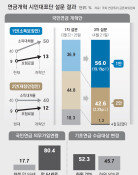Domestic Reactor to Produce Medical Radioactive Isotope
Domestic Reactor to Produce Medical Radioactive Isotope
Posted January. 28, 2009 07:06,
The Korea Atomic Energy Research Institute will begin emergency operation of its research nuclear reactor Hanaro to produce radioactive isotopes for medical purposes given a looming shortage of isotopes.
The Education, Science and Technology Ministry said yesterday that the institute will run the reactor on a trial basis next month and start producing molybdenum-99 in March.
This follows the halt of operations early this year at Canadas National Research Universal reactor, which produces the radioactive fission product molybdenum-99.
Molybdenum-99 is a prerequisite for nuclear medicine imaging that assesses cancer and thyroid gland and renal illnesses.
The ministry said the operation of Hanaro is inevitable because National Research Universal reactor, which has provided 42.8 percent of molybdenum-99 consumed in Korea, was closed and its intended replacement, the Multipurpose Applied Physics Lattice Experiment reactor, is found to have flaws.
Canada, the Netherlands, Belgium, South Africa, France and Germany produce 95 percent of the worlds molybdenum-99. Korea imports the radioactive isotope mostly from Canada, the Netherlands, Belgium and South Africa.
The Netherlands, the worlds second largest producer of molybdenum-99, also closed its worn-out reactor in August last year. This sent the price of the isotope skyrocketing, said a ministry official. The emergency operation of Hanaro is to eliminate impediments to nuclear medicine imaging assessment.
Importers of the isotope sent out official letters urging price increases to hospitals, but the hospitals refused to pay more due to medical insurance costs.
This raises the possibility of recurrence of the halt or delay of the nuclear medicine imaging examination at many hospitals that hit in October last year in the wake of the suspension of production at several overseas reactors.
Many say fundamental solutions are needed because Hanaro can only supply around 30 percent of domestic demand even if it operates at full capacity.
An official at the Korea Radioisotope Association said, The fundamental solution is to build a reactor devoted to producing medial radioactive isotopes.
In a related move, the Nuclear Energy Agency under the Organization for Economic Co-operation and Development will convene a two-day emergency meeting in Paris Thursday on effective ways to supply the isotope.
Attending the meeting will be officials from the Education Ministry, the atomic energy institute, the Korea Institute of Radiological and Medical Sciences, and the radioisotope association.
sohyung@donga.com







